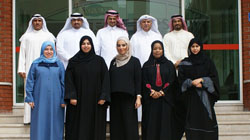

Seef District – The Bahrain Institute of Public Administration (BIPA)
The Bahrain Institute of Public Administration (BIPA) concluded the fifth seminar of the public administration institutes and administrative development of the Cooperation Council for the Arab Gulf states, where participants recommended the need to promote a culture of measurement of performance management among government institutions by focusing on the implementation of training programs for officials and benefit from the views and proposals of dealers and users of services provided in government institutions and include these proposals in the objectives and standards of corporate performance management, as well as the need to take advantage of the national experience applicable to the each country of the GCC for the performance management system in the government sector through exchange of experts and professionals in the performance management systems.
The seminar – held on Sunday and Monday 1&2 April – discussed in its final session the working paper Sultanate of Oman, which presented the digital experience of Oman as a proposed model and highlighted the impact of e-government in its use of information technology and communications through different dimensions such as the administrative, procedural and strategic dimensions.
The Institute of Administrative Development in the State of Qatar presented a working paper under the title “Future challenges for the institutes of public administration in the pursuit of excellence and development of government performance,” which contained the concepts and definitions of excellence and the development of government performance in Qatar and the role of government institutions. The Qatari paper also discussed the current situation in Qatar and highlighted the future challenges for the public administration and development institutions.
The Civil Service Bureau in Kuwait talked about the most prominent systems, modern methods and the ingredients of success in the development of government performance, through a review of methods and ways of working in government entities showing the impact of the use of modern management tools in planning and performance management as well as the benefits of continuous upgrade and enhancement of the process of evaluating performance and efficiency.
At the end of the seminar the participants discussed the working papers and made recommendations to follow up the implementation in the next meeting in Riyadh. They also praised the national experiences of Member States in the management of performance and expressed their desire to take advantage of them during the actual study and application to suit the needs and aspirations of each country.
